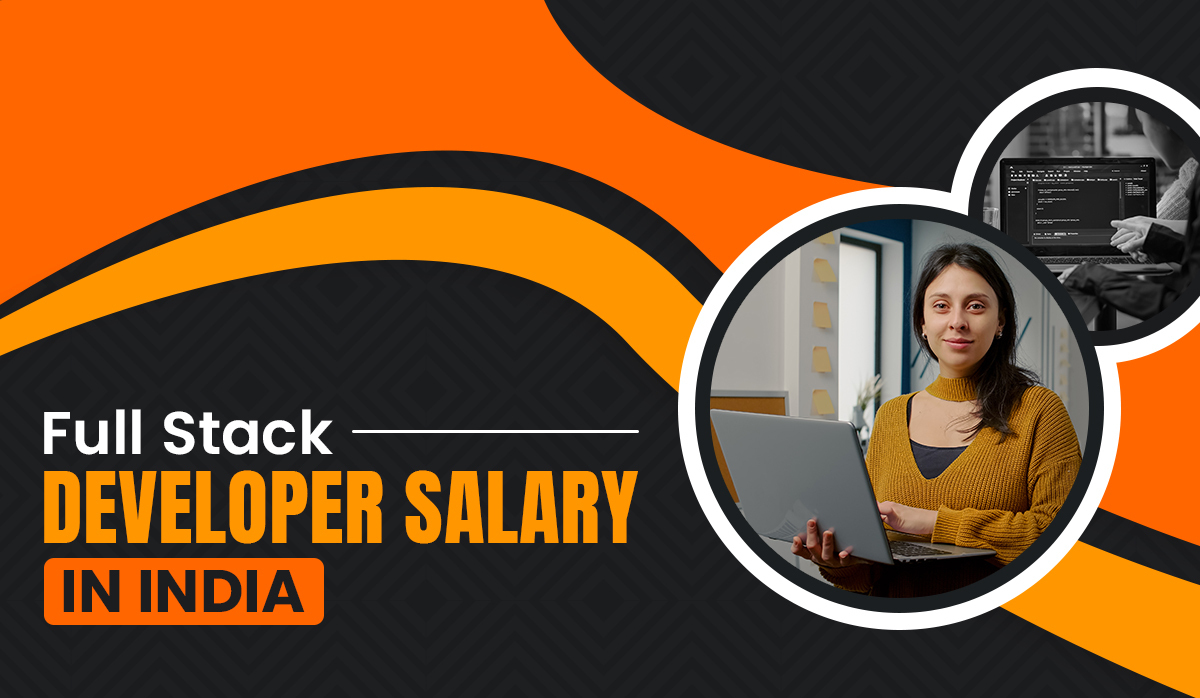Do you want to know how much a full-stack developer makes in India? This blog is just for you! With some of the top technological corporations in the world calling numerous Indian cities, like Bangalore, Hyderabad, and Pune, home, India has recently become a destination for full-stack engineers.
According to Payscale, the yearly compensation range for a full-stack developer in India is between 180,000 and 1600,000. Let’s understand what factors affect a full stack developer salary in India.
Factors Influencing a Full Stack Developer Salary in India?
Developers’ pay is influenced by a variety of factors, including their amount of expertise, location, and industry. The compensation of a full-stack developer may be affected by the following factors:
Experience and skill level
As with most occupations, a full-stack developer’s income potential increases with experience and skill. Salary levels are often higher for developers with numerous years of expertise and a track record of completing successful projects.
Proficiency in Programming Languages
Full stack developers should be proficient in multiple programming languages, such as Java, Python, JavaScript, and Ruby. How long does it take to learn Python, Java, and other programming languages determines the salary scale of the full stack developer.
Location
The city or location can have a big impact on salaries. Due to their higher cost of living and greater need for competent developers, IT centres like Bangalore, Hyderabad, Pune, and Delhi typically pay more.
Company size and reputation
Depending on the company’s size and reputation, salaries vary. Established software giants and well-funded startups frequently offer greater pay and other benefits to entice top employees.
Economic conditions
The general economic environment can also influence salary patterns. Companies are prepared to pay greater salaries to attract and keep talent during economic expansion and increasing commercial activity.
Negotiation skills
The developer’s aptitude for pay haggling also impacts their total compensation.
Who is a Full Stack Developer?
A software engineer proficient in front-end and back-end programming is known as a full-stack developer. Accordingly, they can create both a web or mobile application’s client-side (front-end) and server-side (back-end). They create and manage online software or applications, including the user interface, database, and server-side logic.
They are proficient in many programming languages, including JavaScript, Python, Ruby, and Java, and they are also familiar with front-end technologies like HTML, CSS, and JavaScript frameworks like React, Angular, or Vue.js.
Full stack developer’s roles and responsibilities
A full-stack developer’s position in software development is diverse and essential because they are in charge of both front-end and back-end development duties. The main duties of a full-stack developer are listed below:
Front-end development
They should understand how to create a web app UI and use HTML, CSS, and JavaScript with responsive design. Understanding how to combine UI with back-end data to improve app functionality and user experience is a good skill too.
Back-end development
They should know how to efficiently store and retrieve information and manage databases and data models. As well as setting up procedures for user authentication and permissions, managing application deployment and server configuration, and writing server-side APIs and apps in Python, Java, Node.js, or Ruby.
Database management
The creation and upkeep of databases to house application data. They should be proficient in ensuring the security and integrity of data. Furthermore, optimising database performance and creates effective database queries.
Testing and debugging
Testing and debugging are essential roles in full stack development. Full stack developers need to ensure that their applications are working properly on both the front-end and back-end, and they need to be able to identify and fix any issues that arise during development.
Project management
Collaborating with other team members, including designers, project managers, and other developers, to ensure the effective completion of the project. Timeline estimation, project planning, and project scoping participation. collaborating with other team members, including designers, project managers, and other developers, to ensure the effective completion of the project.
Skills required to become a full stack developer?
- Server-side programming languages like Node.js, Ruby on Rails, PHP, HTML, CSS, and JavaScript.
- Using front-end web development frameworks like React, Angular, or Vue.js and back-end web development frameworks like Express.js, Django, or Laravel.
- UI/UX design basics
- Databases including MySQL, MongoDB, and PostgreSQL, as well as expertise in database design and administration
- Abilities in project management.
- Working knowledge of integrating third-party APIs into software or web apps.
- Knowledge of how to work with other developers and manage code changes using version control systems like Git or SVN.
- Knowledge of methods and tools for testing and debugging, such as Mocha and Chai.
- In addition to having various hard skills, Full Stack Developers need several soft skills to succeed.
Conclusion
In conclusion, the salary of a full stack developer in India is influenced by several factors, including their skills, education level, years of experience, location, and the size and reputation of the company they work for.
As the demand for full stack development continues to grow, developers with strong skills in multiple programming languages and experience in both front-end and back-end development can demand higher salaries. By staying up-to-date with the latest technologies and continuously improving their skills, full stack developers in India can position themselves for successful careers.
